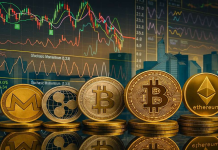# GLOBAL NEWS
In the fast-paced world of global finance, recent developments have highlighted significant shifts in economic policies, corporate earnings, and geopolitical tensions. This article summarizes key events from the United States, Europe, and Asia, reflecting the dynamic landscape of international markets and politics.
## US
The political landscape in the United States is currently marked by intense debates surrounding President Trump’s trade policies and their implications for the economy. Trump is appealing to the Supreme Court to expedite a ruling on his tariffs, which a federal appeals court recently deemed illegal. This decision could have far-reaching consequences for U.S. trade relations and economic stability. Meanwhile, Congress faces a looming government shutdown as partisan divisions deepen, raising concerns about fiscal responsibility and governance.
On the corporate front, Salesforce has reported mixed results, beating earnings estimates but issuing weak revenue guidance that sent its shares tumbling. The tech giant’s CEO confirmed layoffs of approximately 4,000 employees as part of a strategic shift towards artificial intelligence. Similarly, the stock of Figma, a recently public company, plummeted despite reporting better-than-expected earnings, illustrating the volatility in tech stocks amid broader market uncertainties.
In the real estate sector, Norway’s sovereign wealth fund announced a significant investment of $543 million in a Manhattan office building, signaling continued interest in prime U.S. real estate despite economic headwinds. Additionally, mortgage demand has seen a decline after a brief surge, reflecting the challenges faced by potential homebuyers in a fluctuating interest rate environment.
## EUROPE
Europe is grappling with its own set of economic challenges, particularly in the wake of rising inflation and political instability. France, facing a potential government collapse, has seen its CAC 40 index plunge amid fears of renewed political turmoil. The situation echoes past crises in Italy, raising concerns about governance and economic resilience across the region.
In the financial sector, the Bank of England has cut interest rates amid a cooling job market, while the eurozone’s unemployment rate has fallen to a record low, indicating a complex economic landscape. However, Germany’s inflation has risen unexpectedly, casting doubt on the stability of its economy. The European Union is also actively working to eliminate tariffs on U.S. industrial goods in an effort to foster better trade relations, particularly in light of ongoing tensions with the U.S. over tariffs on automobiles.
Notably, Burberry is set to return to the FTSE 100 after a year’s absence, reflecting a broader trend of corporate resilience amid economic uncertainty. Meanwhile, the tech sector remains a focal point, with companies like Alphabet seeing significant stock value increases following favorable antitrust rulings, underscoring the ongoing battle for market dominance in the tech industry.
## ASIA
In Asia, economic dynamics are shifting as countries navigate the impacts of global trade tensions and local challenges. China’s economy is showing signs of resilience, with a recent report indicating that the services sector expanded at its fastest pace in over a year, buoyed by improved domestic demand. However, the country is also facing scrutiny over its trade practices, particularly following the imposition of anti-dumping tariffs on U.S. fiber-optic firms in response to U.S. sanctions.
India’s economic outlook remains cautiously optimistic, with measures to boost domestic consumption amid the backdrop of U.S. tariffs. The Indian government has announced tax cuts aimed at stimulating growth, a move that analysts believe could mitigate the potential negative impacts of Trump’s trade policies.
In Japan, the stock market has reacted positively to a calm bond market, with Japanese equities rallying as investors gain confidence. However, concerns about rising inflation and geopolitical tensions persist, particularly in light of China’s military displays and its implications for regional stability.
As the region grapples with these complex issues, the interplay between economic policies and political developments will continue to shape the landscape of Asian markets.
In conclusion, the global economic environment remains in flux, influenced by a myriad of factors ranging from trade policies and corporate earnings to geopolitical tensions. As nations navigate these challenges, the implications for investors and policymakers will be significant, underscoring the need for adaptive strategies in an ever-changing world.





